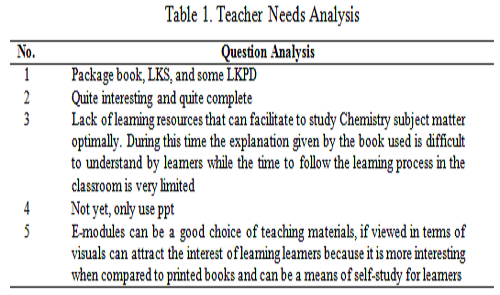
Analysis of Module Needs as Chemical Teaching Materials on Colloidal Subjects in SMA Negeri 1 Tembilahan
Abstract
Keywords
Full Text:
PDFReferences
Andani, D. T., & Yulian, M. (2018). Pengembangan bahan ajar electronic book menggunakan software kvisoft flipbook pada materi hukum dasar kimia di SMA Negeri 1 Panton Reu Aceh Barat. Jurnal IPA & Pembelajaran IPA, 2(1), 1-6.
Hollingsworth, H. L., & Lim, C. I. (2015). Instruction via web-based modules in early childhood personnel preparation: A mixed-methods study of effectiveness and learner perspectives. Early Childhood Education Journal, 43(2), 77-88.
Kazempour, E. (2013). The effects of inquiry-based teaching on critical thinking of students. Journal of Social Issues & Humanities, 1(3), 23-27.
Malina, I., Yuliani, H., & Syar, N. I. (2021). Analisis kebutuhan e-modul fisika sebagai bahan ajar berbasis PBL di MA muslimat NU. Silampari Jurnal Pendidikan Ilmu Fisika, 3(1), 70-80.
Nuryanti, L., Zubaidah, S., & Diantoro, M. (2018). Analisis kemampuan berpikir kritis siswa SMP. Jurnal Pendidikan: Teori, Penelitian, dan Pengembangan, 3(2), 155-158.
Prastowo, A. (2012). Panduan Bahan Ajar Tematik. Yogyakarta: Diva Press
Pratama, R., Alamsyah, M., & Noer, S. (2022). Analisis Kebutuhan Guru Terhadap Pengembangan Modul dalam Meningkatkan Kemampuan Berpikir Kritis Peserta Didik. EduBiologia: Biological Science and Education Journal, 2(1), 7-13.
Rahayu, J., & Solihatin, E. (2019). Pengembangan Modul Pembelajaran Online Pada Mata Pelajaran Kimia. Jurnal Ilmiah Wahana Pendidikan, 5(1), 13-28.
Santosa, A. S. E., Santyadiputra, G. S., & Divayana, D. G. H. (2017). Pengembangan e-modul berbasis model pembelajaran problem based learning pada mata pelajaran administrasi jaringan kelas XII teknik komputer dan jaringan di SMK TI Bali global Singaraja. Kumpulan Artikel Mahasiswa Pendidikan Teknik Informatika (KARMAPATI), 6(1), 1-11.
Sari, O. B. M., Risdianto, E., & Sutarno, S. (2020). Analisis kebutuhan pengembangan LKPD berbasis POE berbantuan augmented reality untuk melatihkan keterampilan proses dasar pada konsep fluida statis. PENDIPA Journal of Science Education, 4(2), 85-93.
Wahyuni, S. (2015, September). Pengembangan bahan Ajar IPA untuk meningkatkan kemampuan berpikir kritis siswa SMP. In PROSIDING: Seminar Nasional Fisika Dan Pendidikan Fisika (Vol. 6, No. 6).
Yanti, N. H., & Hamdu, G. (2021). Analisis Kebutuhan Pengembangan Elektronik Modul Berbasis Education For Sustainable Development Untuk Siswa di Sekolah Dasar. Edukatif: Jurnal Ilmu Pendidikan, 3(4), 1821-1829.
DOI: http://dx.doi.org/10.31258/jes.6.4.p.645-652
Refbacks
- There are currently no refbacks.
Copyright (c) 2022 Andini Saputri, Sjaeful Anwar, Heli Siti Halimatul

This work is licensed under a Creative Commons Attribution 4.0 International License.
Publisher: FKIP Universitas Riau












